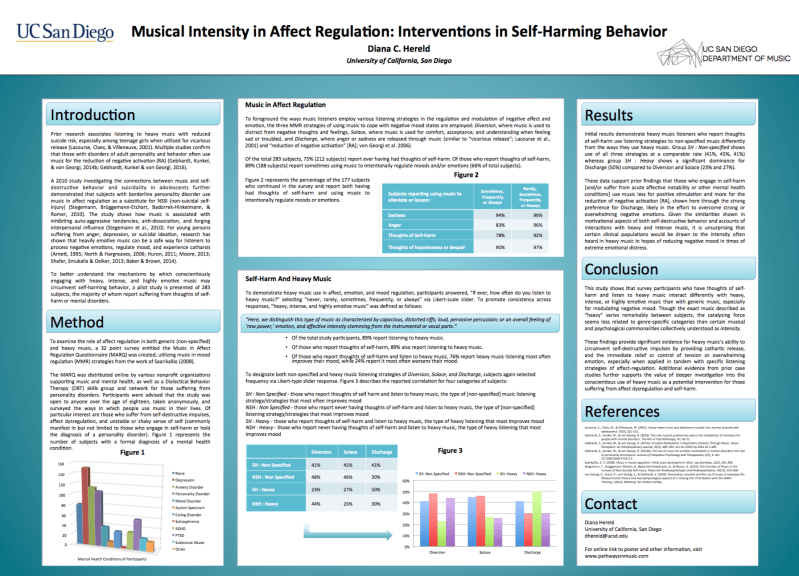In partial fulfillment of my graduate thesis, this poster represents the findings of my study conducted at the University of California, San Diego. Presented July 5, 2016 at the 14th International Conference on Music Perception and Cognition in San Francisco.
For full study, see chapter 2 of my thesis.
For PDF, see HERELD poster ICMPC.
Abstract:
Prior research associates listening to heavy music with reduced suicide risk, especially among teenage girls when utilized for vicarious release. Nevertheless, few studies consider the active use of heavy music in self-regulation for those who suffer from thoughts of self-harm and/or mental illness. In order to to better understand the mechanisms by which engaging with heavy and intense music may circumvent self-harming behavior, a pilot study is presented of 283 subjects. The majority of those surveyed report suffering from thoughts of self-harm or mental disorders. To examine the use of affect regulation via both generic (non-specified) and heavy, intense, and highly emotive music, we created the Music in Affect Regulation Questionnaire (MARQ), utilizing music in mood regulation (MMR) strategies from the work of Saarikallio. We identify heavy music by the presence of capacious, distorted riffs; loud, pervasive percussion; or an overall feeling of ‘raw power,’ emotion, and affective intensity stemming from the instrumental or vocal parts. Our findings collectively show that heavy music listeners (and those who have thoughts of self-harm, in particular) interact with definitively heavy, intense, or highly emotive music differently than with generic music, especially in the use of modulating negative mood. These findings seem less related to genre-specific categories than certain musical commonalities collectively understood as intensity, and provide significant evidence for heavy music’s ability to circumvent self-destructive impulses, especially when applied in tandem with specific listening strategies of affect-regulation. Additional evidence from prior case studies further suggests the value of deeper investigation of the conscientious use of heavy music as a potential intervention for those suffering from affect dysregulation and self-harm.

Musical Intensity in Affect Regulaton: Interventons in Self-Harming Behavior

 Hello all! Sincerest apologies for the severe lack of content over the past year or so. I have been tucked away studying music and psychology at UCSD, and who knew: grad school can be time-consuming! Luckily, I’m unwaveringly passionate about what I have been privileged to research, and I’ve enjoyed…well, many moments 🙂
Hello all! Sincerest apologies for the severe lack of content over the past year or so. I have been tucked away studying music and psychology at UCSD, and who knew: grad school can be time-consuming! Luckily, I’m unwaveringly passionate about what I have been privileged to research, and I’ve enjoyed…well, many moments 🙂


You must be logged in to post a comment.